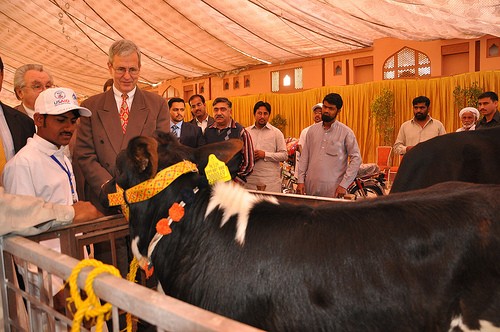Home » News & Information » Press Releases » U.S.-Funded Dairy Project Boosts Rural Economy of Pakistan

Dairy and Rural Development Foundation Pakistan
For Immediate Release
Thursday, May 16, 2013
The USAID Dairy Project has spurred growth in Pakistan's rural economy by helping women farmers increase their incomes and improve their livelihoods. Realizing the pivotal role rural women play in Pakistan's livestock sector, USAID is creating a pool of up to 5,000 locally-trained and readily-available female livestock extension workers to provide veterinary services and advice on the care and feeding of cattle to rural dairy farmers. The project also meets farmers' basic needs by providing them with quality supplies for their animals, such as feed, vitamins, and medication.
The USAID Dairy Project is a catalyst to create new jobs and improve rural livelihoods in Pakistan. "My husband used to work at a private school, but he had to quit his job because of an illness. Now he is unemployed. I was educated through the 12th grade, but I could not find a job," said Asma, a resident of Toba Tek Singh in Punjab. "I was worried about my husband's health and the fact that I couldn't do anything for my children's future even though I am educated. I couldn't sleep at night. But then I heard about this USAID project. I am happy to say that I am now working in my village as a livestock extension worker, providing basic animal healthcare services in my village."
USAID's Dairy Project, launched in July 2011, selects dynamic rural women with a high school diploma and trains them in basic animal health management techniques and entrepreneurship. The program has already trained 2,470 unemployed rural women, helping them earn an average of 2,500 rupees per month. It aims to train an additional 2,530 farmers.
"I am advising people in my village about how to improve milk production," Asma added. "This USAID project has connected us with livestock experts and pharmaceutical companies we didn't know about before. So far, I have treated around 600 animals and earned 46,000 rupees. Now, our household is prosperous and my sick husband is getting treatment. I am also re-investing in my own agriculture business."
Naazra, another beneficiary of the project and a resident of Cheechawatnee, was trained as a livestock extension worker and is now successfully running her own business supplying concentrated feed to local dairy farmers. "USAID trainers introduced me to a quality manufacturer of cattle feed and gave me a mobile phone so I could easily contact suppliers and customers. I have earned 30,000 rupees in three months by selling quality feed. I used the money to develop my business and meet the basic needs of my family. I even bought a refrigerator, which has been very useful for the summer season."
These women represent a symbol of change and are a testimony to the fact that careful interventions, designed based on community needs, can truly transform rural livelihoods. Women like Aasma and Naazra are helping to modernize Pakistan's dairy sector in line with international practices.
The dairy and livestock sectors contribute about 11 percent to the gross domestic product of Pakistan. Forty-five percent of Pakistanis are employed in the agricultural sector. Most dairy farmers have only two to three cattle, and few have access to veterinary services that are crucial to improving milk yields. Dairy farming is vital for the rural economy of Pakistan, and USAID's extensive training programs for dairy farmers, women livestock extension workers, and artificial insemination technicians will continue to play an important role in transforming livelihoods in rural communities.
This USAID initiative is just one part of a comprehensive U.S. economic growth assistance program for Pakistan which includes expanding irrigation by more than 200,000 acres near the Gomal Zam and Satpara dams, constructing more than 1,000 km of roads to connect communities and facilitate trade, and launching private equity investment funds to help small and medium businesses grow.
Watch a story on our successful agricultural assistance, including testimonials from Asma and Naazra, here: https://vimeo.com/62676793.







Comment
Make a general inquiry or suggest an improvement.